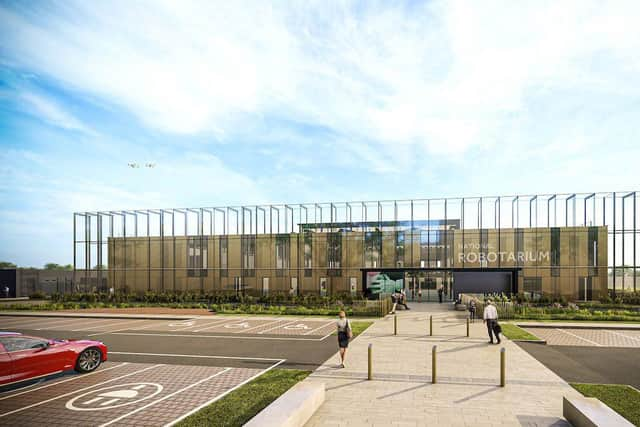Can robots help us to live longer in our own homes?
Experts at Heriot-Watt University say the 'Living Lab' approach - which replicates real-life homes - has huge potential to support older people to 'age in place'.
The research will take on a higher profile when The National Robotarium opens on the Heriot-Watt campus in Edinburgh in spring 2022, with a range of real-life situations to test out robotics.
Professor Lynne Baillie, an expert in human-robot interaction, tells the latest Data Capital podcast from The Scotsman and the Data-Driven Innovation initiative that simple robots can do basic tasks like vacuuming and mowing the lawn - with great potential to do much more.


"A Roomba robot can go around and Hoover your floors, rather than you having to do it….that's a basic level task, and then you can get the more complicated ones where the robot can bring you various things like something you need from the fridge, or answer the door to get a package from Amazon,” she says.
"We're also testing things like a robot reminding people the different steps of how to make a cup of tea or a coffee. We don't want to do it for them, but to remind them of steps that enable them to do it for themselves, to slow cognitive decline."
Robots, working with sensors, can also detect if someone is behaving in an unusual way - such as getting up at different times, or not heating up food when they normally do.
Prof Baillie explains how scenarios like the delivery of a package can be tested in a realistic way in the Assisted Living Lab of the new National Robotarium.
"The Assisted Living Lab is actually open. You can enter it from the main entrance but there's also a door which goes directly to the outside so it’s a self contained apartment, and it has built disabled access and a path straight to the road. So we can enact these things and test them out, in a very safe and secure environment, where we have real deliveries to that apartment. We will test it out with all sorts of different users to see what actually happens in real life."
This is what is called a kerb-to-kitchen approach, where a robot collects the parcel from the delivery person and puts it onto a person’s kitchen table.
Prof Baillie says the university is working on the practical issues with older people, health professionals and charities like Alzheimer's Scotland - and stresses that privacy is paramount.
"We're interested in privacy issues because cameras are very invasive, for example. They should only be used, if you actually need to use them. It shouldn't be something that is always on, filming someone in their own home - by putting in robots and sensing devices, we can actually stop that level of invasion of privacy."
Prof Baillie's colleague, Dr Mauro Dragone, explains that reflecting reality is extremely important in the Assisted Living Lab: "The environment needs to be as realistic as possible because we want people to experience what life will be like with this technology. We need to do that in a realistic environment. We don't want users to step into a laboratory, we want to give them an impression that they are actually stepping into their home, or what their home will look like in the future."
Professor Baillie explains how this approach can then be taken into the community: "We'll start testing and doing experiments and research in a very controlled environment. We can manipulate all the different parts of the experiment that we want and test everything out and it's very safe.
The next thing is we go to an empty apartment, owned by a housing association, for example. And we next test in one which someone is living in [but not someone who needs specific assistance], and then we go in to test it for a short burst of time with actual people who might benefit. It's a very methodical, very thought-out, very phased approach."
You can supply to Data Capital on Anchor FM or wherever you get your podcasts from.